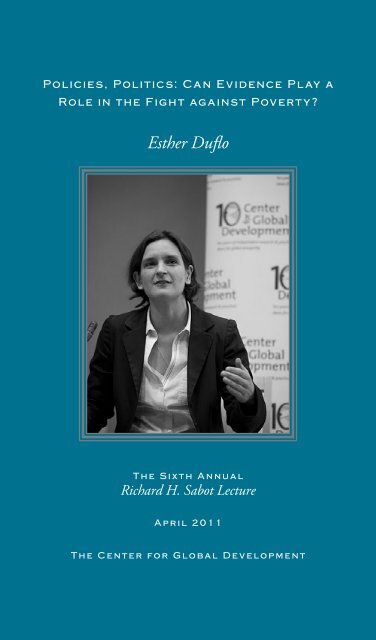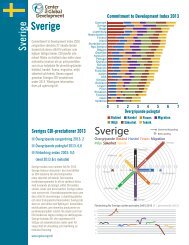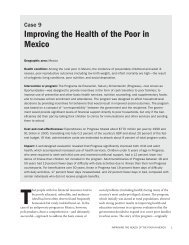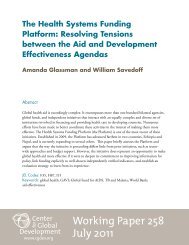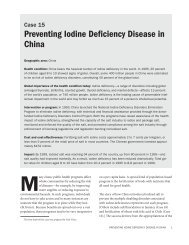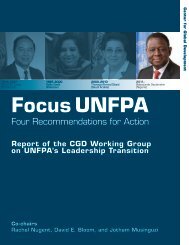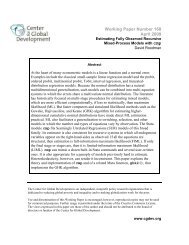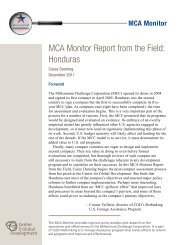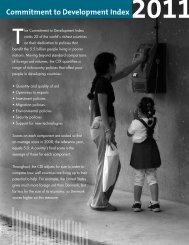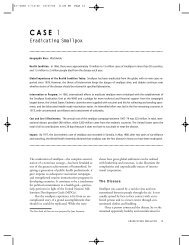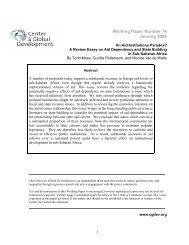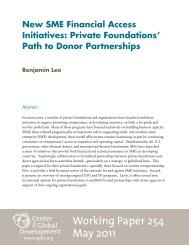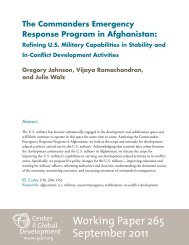Esther Duflo - Center for Global Development
Esther Duflo - Center for Global Development
Esther Duflo - Center for Global Development
Create successful ePaper yourself
Turn your PDF publications into a flip-book with our unique Google optimized e-Paper software.
Policies, Politic s: Ca n E v idence Pl ay a<br />
Role in the Fight aga ins t Pov ert y ?<br />
<strong>Esther</strong> <strong>Duflo</strong><br />
T h e S i x t h A n n u a l<br />
Richard H. Sabot Lecture<br />
A p r i l 2 0 1 1<br />
T h e C e n t e r f o r G l o b a l D e v e l o p m e n t
The Richard H. Sabot Lecture Series<br />
The Richard H. Sabot Lecture is held annually to honor<br />
the life and work of Richard “Dick” Sabot, a respected<br />
professor, celebrated development economist, successful<br />
internet entrepreneur, and close friend of the <strong>Center</strong> <strong>for</strong><br />
<strong>Global</strong> <strong>Development</strong> who died suddenly in July 2005. As<br />
a founding member of CGD’s board of directors, Dick’s<br />
enthusiasm and intellect encouraged our beginnings.<br />
His work as a scholar and as a development practitioner<br />
helped to shape the <strong>Center</strong>’s vision of independent research and new ideas in<br />
the service of better development policies and practices.<br />
Dick held a PhD in economics from Ox<strong>for</strong>d University; he was Professor<br />
of Economics at Williams College and taught previously at Yale University,<br />
Ox<strong>for</strong>d University, and Columbia University. His contributions to the fields of<br />
economics and international development were numerous, both in academia<br />
and during ten years at the World Bank.<br />
The Sabot Lecture Series hosts each year a scholar-practitioner who has made<br />
significant contributions to international development, combining, as did<br />
Dick, academic work with leadership in the policy community. We are grateful<br />
to the Sabot family and to CGD board member Bruns Grayson <strong>for</strong> the<br />
support to launch the Richard H. Sabot Lecture Series.<br />
Previous Lectures<br />
2010 Kenneth Rogoff, “Austerity and the IMF.”<br />
2009 Kemal Derviş, “Precautionary Resources and Long-Term <strong>Development</strong><br />
Finance.”<br />
2008 Lord Nicholas Stern, “Towards a <strong>Global</strong> Deal on Climate Change.”<br />
2007 Ngozi Okonjo-Iweala, “Corruption: Myths and Reality in a<br />
Developing Country Context.”<br />
2006 Lawrence H. Summers, “Harnessing the <strong>Development</strong> Potential of<br />
Emerging Market Reserves.”
<strong>Esther</strong> <strong>Duflo</strong><br />
<strong>Esther</strong> <strong>Duflo</strong> is a leading development economist known<br />
<strong>for</strong> her work applying impact evaluation, randomized<br />
controlled trials, and other field experiments to identify<br />
what works in development interventions.<br />
<strong>Duflo</strong> is the Abdul Latif Jameel Professor of Poverty<br />
Alleviation and <strong>Development</strong> Economics at the<br />
Massachusetts Institute of Technology and co-founder<br />
of the Abdul Latif Jameel Poverty Action Lab (J-PAL), a research network<br />
specializing in randomized evaluations of social programs. She was named a<br />
MacArthur Foundation Fellow in 2009 and received the 2010 John Bates Clark<br />
Medal <strong>for</strong> leading economist under the age of <strong>for</strong>ty.<br />
Her Sabot lecture draws upon her new book with Abhijit Banerjee, a J-PAL<br />
co-founder, titled Poor Economics: A Radical Rethinking of the Way to Fight<br />
<strong>Global</strong> Poverty. <strong>Duflo</strong> and Banerjee’s research has led them to identify wholly<br />
new aspects of the behavior of poor people, their needs, and the way that aid<br />
or financial investment can affect their lives.<br />
<strong>Duflo</strong> completed her undergraduate studies at L’Ecole Normale Supérieure<br />
and holds a PhD in economics from MIT. She is the founding editor of the<br />
American Economic Journal: Applied Economics.
Policies, Politics: Can evidence play a<br />
role in the fight against poverty?1<br />
<strong>Esther</strong> <strong>Duflo</strong> | 1<br />
Most of my work has focused on trying to figure out what policy may work<br />
in helping to address the various problems linked to poverty. To this end, I<br />
have worked on the evaluation of the effectiveness of various policy options,<br />
particularly (but not only) on randomized evaluation. I have also spent a lot of<br />
time trying to understand how people behave, and why they behave the way<br />
they do, at the most micro level. In that, I have tried, as Richard Sabot’s son<br />
just said his father told us, to learn from failures as much as from successes.<br />
In our new book, Poor Economics, Abhijit Banerjee and I trying to dissect<br />
what has been learned, in decades of work on development economics,<br />
about the key problems and issues that affect the economic lives of the poor:<br />
health, education, savings, credit, labor markets, and more. Our view is that<br />
one needs to understand these issues in detail to be able to design effective<br />
policy, and that a key reason why a lot of ef<strong>for</strong>ts to help the poor have failed is<br />
because they have been based on a misunderstanding of the problems that they<br />
were trying to get at, and a failure to learn from experience. This may seem<br />
somewhat reminiscent of a management book from the 1950s. But what is<br />
striking is how far away the process of policymaking usually is from this ideal.<br />
For example, countries spend considerable time and ef<strong>for</strong>t trying to deliver<br />
food to people even though all the evidence suggests that, except in rather<br />
extraordinary circumstances, the poor are not particularly hungry <strong>for</strong> more<br />
calories, and not particularly willing to eat much more even when calories<br />
become cheaper or when they become a bit richer. The problem seems more<br />
about finding ways to improve the nutritional quality of what they eat.<br />
The text of this lecture is adapted from chapter 10 of Poor Econonomics: A Radical Rethinking of the<br />
Way to Fight <strong>Global</strong> Poverty, by Abhijit Banerjee and <strong>Esther</strong> <strong>Duflo</strong> (PublicAffairs, 2011).
2 | Sixth Annual Richard H. Sabot Lecture<br />
Another example is education: much ef<strong>for</strong>t has been devoted to put kids in<br />
front of a classroom and a teacher, but less to try to understand what, and<br />
how, they should be taught. As a result, most kids are in school, but only<br />
about half can read anything. This is a huge waste of time, resources, and—<br />
most of all—talent. And yet, in principle, it can be fixed.<br />
Many people are suspicious of these ef<strong>for</strong>ts. Bill Easterly once wrote of<br />
randomized control trials: “RCTs are infeasible <strong>for</strong> many of the big questions<br />
in development, like the economy-wide effects of good institutions or good<br />
macroeconomic policies.” Then, he concluded that “embracing RCTs has<br />
led development researchers to lower their ambitions.”1 This statement was<br />
a good reflection of what we call the “institutionalist view,” a view that is<br />
popular among many scholars and policymakers today. The real problem of<br />
development, in this view, is not one of figuring out good policies: it is to sort<br />
out the political process. If the politics are right, good policies will eventually<br />
emerge. And conversely, without good politics, it is impossible to design or<br />
implement good policies, at least not at any scale.<br />
The current events in Tunisia, Egypt, Libya, and Syria certainly lead one to<br />
think about this: isn’t it the case that the revolutions, whatever their fate, are<br />
the events that are going to have first-order effects on those countries, rather<br />
than any ef<strong>for</strong>t we could have been engaged in to, say, improve how the labor<br />
markets works there? Then there is Côte d’Ivoire: how much good would it do<br />
today to know the best way to convince parents to immunize their children?<br />
Isn’t the problem more that we need a functioning government there?<br />
This view of institutions can easily lead to pessimism: as our colleagues Daron<br />
Acemoglu and Jim Robinson have argued, institutions have a tendency to<br />
1. William Easterly, “<strong>Development</strong> Experiments: Ethical? Feasible? Useful?” blog posted to Aid<br />
Watch July 16, 2009, http://aidwatchers.com/2009/07/development-experiments-ethical-feasible-<br />
useful/.
<strong>Esther</strong> <strong>Duflo</strong> | 3<br />
persist.2 Current leaders that have inherited poor institutions will have the<br />
desire (and the ability) to keep them. We don’t really know how institutions<br />
can change: episodes of wholesale institutional changes are few and far<br />
between, and we don’t know how to predict them, let alone what would foster<br />
them.<br />
I do not want to minimize the role of politics. But what I would like to<br />
argue today (based on the last chapter of our book) is that the primacy of<br />
politics over policy that is at the heart of the institutionalist view is perhaps<br />
overemphasized. What we term the political-economy view is that without<br />
good politics, there won’t be good policies and, conversely, that good policies<br />
will follow from politics. I want to argue that neither is true. It might even<br />
be possible to reverse the argument: perhaps good politics will follow good<br />
policies.<br />
I’ll proceed in three steps. First, I will try to argue that perhaps institutions<br />
are not qualitatively different from any other <strong>for</strong>m of policy: like everywhere<br />
else, details matter. Within a broad frame, there is considerable scope <strong>for</strong><br />
improvement in how institutions work in practice. Second, I will argue that,<br />
even given a set of institutions, there is usually considerable scope to improve<br />
policy. Third, good politics can sometimes follow from good policy, easily<br />
setting off a virtuous circle.<br />
INSTITUTIONS versus institutions<br />
The political-economy view starts from a broad definition of institutions as<br />
rules of engagement: democracy or autocracy, property rights, and so on. And<br />
indeed, broad institutional changes are few and far between: we rarely see<br />
successful major transition to democracy; we rarely see a complete cleanup<br />
of corrupt countries. However, these broad INSTITUTIONS, in capital letters,<br />
2. A great overview of their thinking is available in their <strong>for</strong>thcoming book Why Nations Fail<br />
(Crown publishers).
4 | Sixth Annual Richard H. Sabot Lecture<br />
define only very broad frameworks. Within them, institutions (lowercase)<br />
are actually incarnated on the ground with many very specific rules. There is<br />
considerable scope <strong>for</strong> improvement and changes, both within generally “bad”<br />
institutions and, perhaps more importantly, within generally good ones.<br />
Improvements within “bad” INSTITUTIONS<br />
Let’s first look at the changes within generally bad broad INSTITUTIONS. My<br />
first example is from a paper by Monica Martinez-Bravo, Gerard Padro-i-<br />
Miguel, and Nancy Qian, who study the role of democratic re<strong>for</strong>m in China.3<br />
Although wholesale democratic re<strong>for</strong>ms are few and far between, there are<br />
many instances where democracy has been introduced, to a limited extent and<br />
at the local level, within an authoritarian regime. Electoral re<strong>for</strong>ms have even<br />
taken place in otherwise authoritarian states such as Indonesia under Suharto,<br />
Brazil during the military dictatorship, and Mexico under the Institutional<br />
Revolutionary Party (PRI). More recently, local elections have been introduced<br />
in Vietnam in 1998, Saudi Arabia in 2005, and Yemen in 2001. These re<strong>for</strong>ms<br />
are very imperfect: the elections are often rigged, and the elected officials have<br />
very limited powers.<br />
Yet, Qian and others show that even very imperfect local elections can make<br />
a substantial difference in how local governments are run. In the early 1980s,<br />
village-level elections were progressively introduced in rural China. Early on,<br />
the Communist Party still decided who was allowed to run. The Communist<br />
Party branch continued to operate in the village, with its appointed secretary.<br />
Ballots were not always anonymous, and the ballot boxes were reportedly often<br />
stuffed.<br />
Despite these shortcomings, the authors found that the re<strong>for</strong>ms had a<br />
surprisingly large effect, suggesting greater accountability to villagers. After<br />
3. Monica Martinez-Bravo et al., “Accountability in an Authoritarian Regime: The Impact of<br />
Local Electoral Re<strong>for</strong>ms in Rural China,” manuscript, Yale University (2010).
<strong>Esther</strong> <strong>Duflo</strong> | 5<br />
a village starts holding elections, the village chiefs are more likely to relax<br />
unpopular central policies, such as the one-child policy. The reallocation of<br />
farmland, which happens from time to time in Chinese villages, is more likely<br />
to benefit “middle-class” farmers. Public expenditures are more likely to reflect<br />
villagers’ needs.<br />
Another example is corruption. Is it possible to fight corruption with “small”<br />
re<strong>for</strong>ms or do you need to fix the entire system? Take Indonesia <strong>for</strong> example.<br />
It is one of the most corrupt countries in the world. In 2010, it ranked 110th<br />
out of 178 countries in Transparency International’s Corruption Perceptions<br />
Index.4 In a randomized field experiment there, Benjamin Olken of Harvard<br />
University found that theft was rife on locally managed projects: 20 percent of<br />
the materials and 27 percent of the wage bill was stolen by local contractors or<br />
the village teams.5 This means that the road are fragile, likely to break down at<br />
the first big rains.<br />
Can this local corruption be uprooted without affecting the deeper institutions<br />
that make Indonesia such a corrupt country? Ben Olken decided to try this<br />
out by running an experiment in about 600 villages. In some of them, the<br />
local teams were warned that their account would be audited. Importantly, it<br />
was not a shock team from the World Bank that was going to audit them, but<br />
the same government auditors, likely to be corrupt themselves. Who was going<br />
to monitors the monitors? Was this not doomed to failure? And yet, in villages<br />
were the threat of audit was present, theft declined by one third.<br />
A third example of changes at the margin is given by the success of simple<br />
programs to address so-called ethnic voting. One reason why democracies fail<br />
in Africa, it is often argued, is that voting is often based on ethnic loyalties,<br />
which means that the candidate from the largest ethnic group often wins,<br />
4. See www.transparency.org/policy_research/surveys_indices/cpi/2010/results.<br />
5. Benjamin A. Olken, “Monitoring Corruption: Evidence from a Field Experiment in Indonesia,”<br />
Journal of Political Economy 115(2):200–249.
6 | Sixth Annual Richard H. Sabot Lecture<br />
whatever his intrinsic merit. The traditional view in political science and<br />
political economy is that this is the product of deep social <strong>for</strong>ces, or a social<br />
equilibrium that is hard to change. Systemic changes would be needed to fix<br />
this. Is that really the case?<br />
In Benin, Leonard Wantchekon of NYU ran a pair of experiments that shed<br />
very interesting light on this phenomenon.6 I’ll mention one experiment now<br />
and the other much later in the talk. The first experiment clearly establishes<br />
that ethnic voting is a problem in Benin. The experiment took place in<br />
relatively stable constituencies <strong>for</strong> some of the major candidates. In all of<br />
them, pairs of villages were randomized, and different discourses were given<br />
during the village meetings.<br />
The clientelist message read as follows:<br />
We are the representatives of the candidate Saka Lafia, who is running<br />
<strong>for</strong> president in the March 3, 2001, election. As you know, Saka is the<br />
only Bariba candidate, actually the first since 1960. Saka is running<br />
because the northeast region, Borgou-Alibori, is very underdeveloped:<br />
low literacy rates, poor rural infrastructure and health care, etc. . . . If<br />
elected, he will help promote the interests of the Borgou-Alibori region<br />
by building new schools, hospitals, and roads and more importantly,<br />
hiring more Bariba people in the public administration.<br />
And the public-policy message read:<br />
We are the representatives of Saka Lafia, our party the UDS stands<br />
<strong>for</strong> democracy and national solidarity. Saka is running against the<br />
opposition candidate in the North. If elected, he will engage in a<br />
nationwide re<strong>for</strong>m of the education and health care systems with<br />
6 Leonard Wantchelon, “Clientelism and Voting Behavior: Evidence from a Field Experiment in<br />
Benin,”World Politics 55(3):399–422.
<strong>Esther</strong> <strong>Duflo</strong> | 7<br />
emphasis on building new schools, new hospitals, and vaccination<br />
campaigns. In conjunction with other opposition leaders, we will fight<br />
corruption and promote peace between all ethnic groups and all the<br />
regions of Benin.<br />
The clientelist message carried almost 80 percent of the vote; the public-policy<br />
message, just under 60 percent.<br />
Keep this experiment in mind, because we will return to another experiment<br />
in Benin a little bit later in the talk. But in the meantime, let’s go to Uttar<br />
Pradesh to investigate whether ethnic voting is particularly entrenched.<br />
Would people be willing to stop voting on caste issues if they were asked not<br />
to? This seems a bit preposterous, but an experiment by Abhijit Banerjee,<br />
Rohini Pande, and Don and Jennifer Green suggests that it may not be that<br />
difficult to affect ethnic voting in Uttar Pradesh, where caste-based voting is a<br />
defining feature of the political system.<br />
The researchers worked with an NGO that went to some villages and simply<br />
asked people to vote not by caste, but on the issues. And, remarkably, people<br />
were convinced. The simple message, which had no specific in<strong>for</strong>mation on<br />
any of the candidates, was conveyed through puppet shows, discussions, and<br />
children plays; it reduced the probability that voters would choose a candidate<br />
from their own caste from 25 percent to 18 percent.7<br />
7. Abhijit Banerjee at al., “Can Voters Be Primed to Choose Better Legislators? Experimental<br />
Evidence from Rural India,” working paper (2009), http://weber.ucsd.edu/~jlbroz/PElunch/<br />
Pahnde_05_10_pande.pdf.
8 | Sixth Annual Richard H. Sabot Lecture<br />
Scope of improvement within “good”<br />
institutions<br />
Finally, a huge margin <strong>for</strong> action arises from the fact that even “good” broad<br />
institutions do not function all that well in practice. There is tremendous scope<br />
<strong>for</strong> improving them. Brazil provides a dramatic example, as Thomas Fujiwara<br />
describes in a remarkable paper.8 Brazil’s democracy is particularly vibrant,<br />
with many candidates contesting elections. In the elections Fujiwara describes,<br />
this had the paradoxical result of making voting a very difficult operation.<br />
Voters, many of whom had problems with reading and writing, had to choose<br />
a candidate and write his or her name or candidate number on a ballot. As a<br />
result, many of the votes were discounted because they were invalid.<br />
At some point, Brazil introduced electronic voting, not particularly to address<br />
this problem, but because it made it easier to count the votes. Nonetheless, it<br />
became much easier <strong>for</strong> people to choose their candidates. The system was first<br />
introduced in large constituencies and then rolled out everywhere. Thomas<br />
Fujiwara uses that roll out to investigate the effect on the elections.<br />
The re<strong>for</strong>m had a dramatic effect on the number of invalid votes, which<br />
essentially went to zero. Further, the “new” votes were mainly coming from<br />
the poor, and going to candidates representing the interest of the poor. And<br />
policies became more pro-poor in this area.<br />
Brazil, a country which is now doing a lot <strong>for</strong> the poor, was unintentionally<br />
disenfranchising about 10 percent of its population simply through “technical”<br />
errors: this gives us the measure of how much can be improved with politics,<br />
even in “good” institutions. We have many more examples in the book, but<br />
I want to shift to the second step in my demonstration: even we take the<br />
institutions as given, there is considerable scope <strong>for</strong> improving policies.<br />
8. Thomas Fujiwara, “Voting Technology, Political Responsiveness, and Infant Health: Evidence<br />
from Brazil,” mimeo, University of British Columbia (2010).
There is Room <strong>for</strong> New policies within<br />
existing institutions<br />
<strong>Esther</strong> <strong>Duflo</strong> | 9<br />
I will spend less time on this now, although this is of course a recurrent topic<br />
in the book. Even if we go down to the details, we find that institutions are far<br />
from fully determining the political outcomes. First, good policies sometimes<br />
happen in bad political environment: it is in Suharto’s Indonesia that 62,000<br />
primary schools were built with oil money, leading to increases in wages and<br />
reductions in fertility and infant mortality <strong>for</strong> the children who attended these<br />
new schools.9<br />
More importantly, plenty of bad policies happen in good policy environments,<br />
not because of any great conspiracy to keep the poor poor, but simply<br />
because, in practice, policies don’t just magically emerge out of the democratic<br />
process. Policymaking does not happen in the void. Policies are written,<br />
and implemented, by men and women who are sometimes without good<br />
intentions but usually perfectly willing to do the best they can. But like<br />
anything else, policymaking is difficult: it requires a very good understanding<br />
of a problem. We usually get it wrong. Policymakers, like anyone else, are<br />
often subject to the temptation of “lazy thinking.” And unlike in business,<br />
there is no market test to know the impact of the policy in advance.<br />
This is one important reason why government programs (and similar programs<br />
run by NGOs and international organizations) often do not work. The<br />
problem is inherently difficult and the details need a lot of attention. Failures<br />
are often not due to sabotage by a specific group, as a lot political economists<br />
would have it, but because the whole system was badly conceived to start with,<br />
and no one has taken the trouble to fix it.<br />
9. <strong>Esther</strong> <strong>Duflo</strong>, “Schooling and Labor Market Consequences of School Construction in<br />
Indonesia: Evidence from an Unusual Policy Experiment,” American Economic Review 91(4):<br />
795–813.
10 | Sixth Annual Richard H. Sabot Lecture<br />
We call this the three-I problem: ideology, ignorance, inertia. Schemes<br />
conceived of in ideology (some cartoon-character view of what the poor<br />
need or want) and in ignorance of the realities in the field persist out of<br />
sheer inertia; once they exist, they are difficult to get rid of. We encounter<br />
the three-I problem routinely in our work. We were especially struck by it<br />
when we decided to start a project on village education committees in Uttar<br />
Pradesh. Every village in India now must have a village education committee:<br />
beneficiary participation is what the World Bank recommends to fix broken<br />
public services, and India has embraced it with enthusiasm.<br />
We went to hundreds of villages in Uttar Pradesh and asked about people’s<br />
views of and experiences with the village education committees. Only 8<br />
percent of villagers knew that their village education committee existed;<br />
only 2 percent knew what they were supposed to do; and 25 percent of the<br />
committee members did not know they were members.10 The committee<br />
was totally disengaged with the school. Ef<strong>for</strong>ts by Pratham, a large NGO, to<br />
reinvigorate them were completely useless. And yet, at the same time, Pratham<br />
managed to persuade scores of volunteers to teach children <strong>for</strong> free outside of<br />
school hours.<br />
We once asked the education secretary in Lucknow about the scheme. We<br />
were told that the committee must have “the parents of the best child in the<br />
school, the worst child in the school, and the parent of the handicapped<br />
child.” This was the same secretary who noted that exams had been abolished<br />
in primary school. She had no idea of how the villages or the teachers were<br />
supposed to implement this rule.<br />
This program suffered from the classic three-I problem. Inspired by an<br />
ideology—people’s power is good—and designed in ignorance of what people<br />
want and how the village works, it was, by the time we were studying it,<br />
10. Abhijit Banerjee et al., “Pitfalls of Participatory Programs: Evidence from a Randomized<br />
Evaluation in Education in India,” American Economic Journal: Economic Policy 2(1): 1–20.
<strong>Esther</strong> <strong>Duflo</strong> | 11<br />
entirely sustained by inertia. No one had paid any attention to it <strong>for</strong> many<br />
years, except <strong>for</strong> some bureaucrat somewhere who was making sure that all the<br />
boxes had been checked.<br />
Improving policies could lead to improving<br />
politics<br />
Good politics may or may not be necessary <strong>for</strong> good policies; it is certainly<br />
not sufficient. Large-scale waste and policy failure often happen not because of<br />
any deep structural problem, but because of lazy thinking at the stage of policy<br />
design. There is thus a tremendous amount of slack to improve policies—by<br />
spending more time on designing them and by constantly evaluating them.<br />
How to do that is what we devote most of the book to.<br />
But to conclude, I would like to propose a reversal to the primacy of politics<br />
over policy. I often have the feeling that, if politics is so depressing in<br />
developing countries, it is because voters feel that they have to choose between<br />
bad and worst: this may explain why, by default, they vote <strong>for</strong> someone from<br />
their caste. No one is in a position to credibly offer them an alternative.<br />
In Leonard Wantchekon’s Benin experiment, <strong>for</strong> example, perhaps voters<br />
simply did not believe the rather bland “public interest” message. Perhaps they<br />
would have if the message had been backed by some real proposals and did not<br />
ring a little bit empty.<br />
In fact, we don’t need to say “perhaps” because Wantchekon ran a second<br />
experiment, during the next presidential election, that demonstrates exactly<br />
that.11<br />
11. Leonard Wantchekon, “Can In<strong>for</strong>med Public Deliberation Overcome Clientelism?<br />
Experimental Evidence from Benin,” manuscript, New York University (2009).
12 | Sixth Annual Richard H. Sabot Lecture<br />
With his think tank and friends in Benin, he organized a large policy<br />
conference—one of those “expert” conferences that would probably make<br />
Bill Easterly recoil (it even had international experts, although they were<br />
mainly from neighboring countries). The conference was called “Election<br />
2006: What Policy Alternative?” There were four panels on education, public<br />
health, governance, and urban planning. Four experts (two from Benin and<br />
two from neighboring Niger and Nigeria) provided a white paper with policy<br />
recommendations.<br />
After the conference, parties volunteered to use the recommendations as a<br />
policy plat<strong>for</strong>m as part of an experiment. Again focusing on relatively safe<br />
seats, the parties grouped villages in pairs. In some villages, they conducted the<br />
usual festive meetings, complete with balloons, T-shirts, and clientelist appeal.<br />
In others, they ran “town hall meetings” in which the proposals were discussed<br />
in a serious manner.<br />
And this time, the results were reversed: it is the reasoned policy plat<strong>for</strong>m that<br />
got more votes, not the clientelist appeal. Good policies can improve politics<br />
because voters, even the poorest, have the desire and the ability to engage with<br />
policies.<br />
Conclusion<br />
The message in conclusion is one of hope, but also of responsibility. The<br />
problems that face the poor are incredibly difficult to fully grasp and<br />
understand. Mostly, we get it wrong, and as a result the solutions we come up<br />
with are disappointing, and progress is slow.<br />
But we cannot hide behind fatalism as an excuse to do nothing: neither<br />
bad politics nor bad policies are fatalities of poor countries. Real politics<br />
can be improved, step by step. Policies can be improved even within given<br />
institutional environments. And improving policies may well be the first step<br />
to improving politics.
<strong>Esther</strong> <strong>Duflo</strong> | 13<br />
They both can be improved, here and now, perhaps not everywhere in a<br />
revolutionary ardor like the one we are seeing in the Middle East, but step<br />
by step, in a quiet revolution. Where the responsibility lies is with everyone.<br />
Everyone has a role to play in this process. It is not someone else’s job to figure<br />
it out, or let it happen. It is our collective duty, here in the West as well as in<br />
developing countries.
The <strong>Center</strong> <strong>for</strong> <strong>Global</strong> <strong>Development</strong><br />
The <strong>Center</strong> <strong>for</strong> <strong>Global</strong> <strong>Development</strong> works to reduce global poverty and<br />
inequality through rigorous research and active engagement with the policy<br />
community to make the world a more prosperous, just, and safe place <strong>for</strong> us<br />
all. The policies and practices of the rich and the powerful—in rich nations,<br />
as well as in the emerging powers, international institutions, and global<br />
corporations—have significant impacts on the world’s poor people. We aim to<br />
improve these policies and practices through research and policy engagement<br />
to expand opportunities, reduce inequalities, and improve lives everywhere.<br />
By pairing research with action, CGD goes beyond contributing to knowledge<br />
about development. We conceive of and advocate <strong>for</strong> practical policy<br />
innovations in areas such as trade, aid, health, education, climate change, labor<br />
mobility, private investment, access to finance, and global governance to foster<br />
shared prosperity in an increasingly interdependent world.<br />
Edward Scott*<br />
Chair<br />
Nancy Birdsall*<br />
President<br />
Tomothy D. Adams*<br />
C. Fred Bergsten<br />
Henrietta H. Fore<br />
David Gergen<br />
Thomas R. Gibian*<br />
C. Boyden Gray<br />
James Harmon<br />
Bradley Horwitz<br />
Enrique V. Iglesias<br />
Kassahun Kebede<br />
Masood Ahmed<br />
Jere Behrman<br />
Thomas Carothers<br />
Kemal Derviş<br />
Shanta Devarajan<br />
<strong>Esther</strong> <strong>Duflo</strong><br />
William Easterly<br />
Kristin Forbes<br />
Board of Directors<br />
Mark Malloch-Brown<br />
Edward E. McNally*<br />
Robert Mosbacher, Jr.<br />
Ngozi Okonjo-Iweala<br />
Lant Pritchett (ex officio)<br />
Sheryl Sandberg<br />
S. Jacob Scherr<br />
Smita Singh<br />
Patty Stonesifer<br />
Belinda Stronach<br />
Lawrence H. Summers<br />
Toni G. Verstandig<br />
Adam Waldman*<br />
Carol Graham<br />
Simon Johnson<br />
Anne Krueger<br />
Gina Lambright<br />
Nancy Lee<br />
David Lindauer<br />
Mark Medish<br />
Edward Miguel<br />
Advisory Group<br />
Jonathan Morduch<br />
Deepa Narayan<br />
Jane Nelson<br />
Rohini Pande<br />
Kenneth Prewitt<br />
Lant Pritchet (Chair)<br />
Raymond Robertson<br />
Dani Rodrik<br />
Honorary Members<br />
John L. Hennessy<br />
Sir Colin Lucas<br />
Amartya K. Sen<br />
Joseph E. Stiglitz<br />
* Member of the Executive<br />
Committee<br />
David Rothkopf<br />
Rebecca Thornton<br />
John Williamson<br />
Eric Werker<br />
Ngaire Woods<br />
Ernesto Zedillo
Independent research and<br />
practical ideas <strong>for</strong> global prosperity<br />
www.cgdev.org<br />
1800 Massachusetts Ave, NW<br />
Third Floor<br />
Washington, DC 20036


